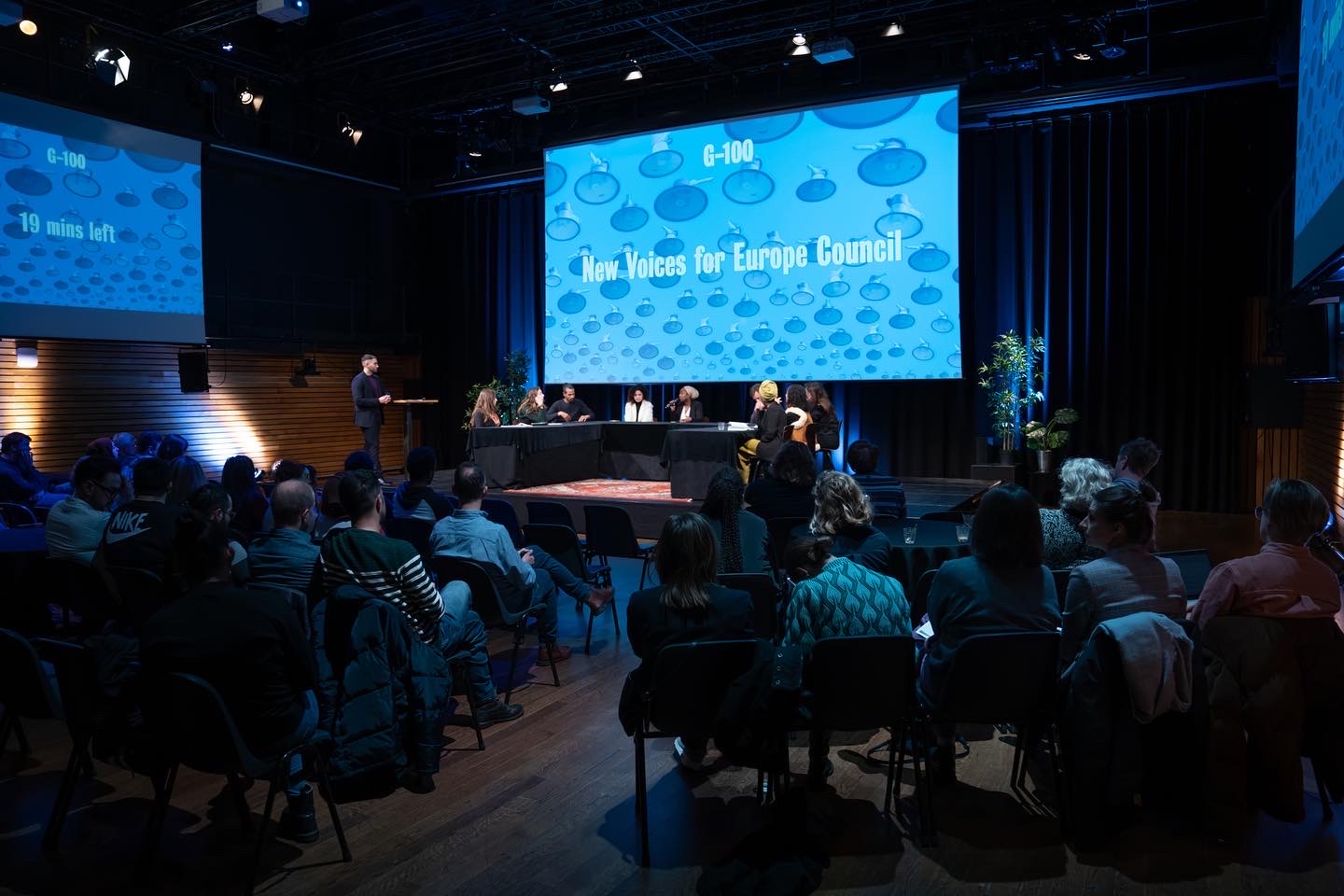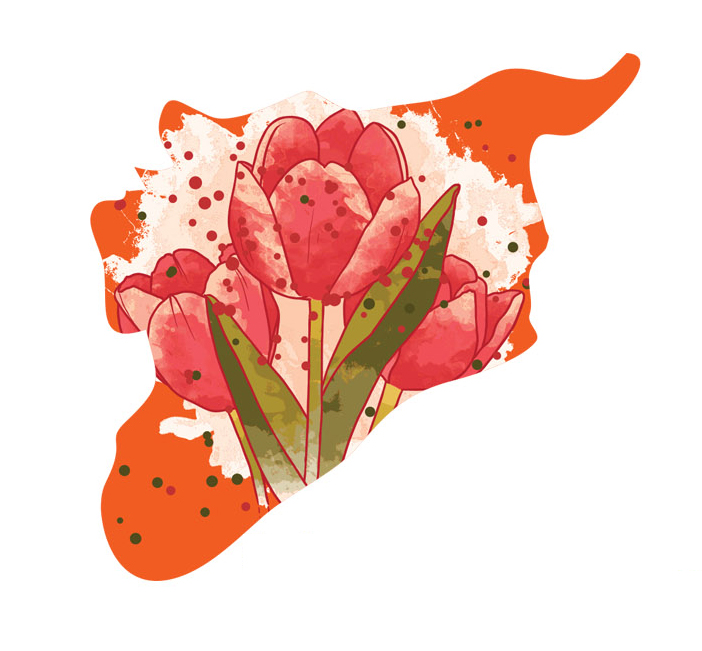
G100 – New Voices for Europe
Today, over 4.6 million people seek safety in Europe due to conflicts and violence from Ukraine, Syria, Afghanistan, and other parts of the world, but their voices are not represented in the new EU member states they settled in. Newcomers do not have the right to vote or stand up in elections. Leaving them trapped in a chain of challenges without having the means to tackle them in a meaningful and participatory way.
We need to go beyond the idea that democracy is just casting a ballot. That’s why newcomers took the initiative and kicked off a series of G-100 workshops and conferences, based on the G-1000 ‘Burgertop’. The main goal is to speak up and ensure that newcomers’ voices are heard in decision-making processes through participatory bottom-up approaches. During the day, newcomers (refugees, migrants, asylum seekers) will work together with experts to analyze their lived experiences in relation to the themes: access to (mental) health, access to equitable work, and education opportunities. Further, they will develop policy recommendations, and discuss these with policymakers.
The event, consisting of a co-creation workshop and a conference, took place on Monday the 12th of December 2022 at Pakhuis de Zwijger. The aim of this event was to discuss the challenges that newcomers (refugees and migrants) face and make their voices heard in decision-making processes. A full day of co-creation workshops and a conference with policymakers and experts.
What are the outcomes?
The G100 addressed their priorities when it comes to integration policy. The main topics that were discussed are:
📌 Access to (mental health)
📌 Access to equitable work and education opportunities
The G100 participants shared their lived experiences and what obstacles prevented them from achieving their aspirations. These are some of the important quotes that came during the co-creation workshop:
“The problem is they do not acknowledge our diplomas. A master’s degree is acknowledged as an HBO. I am a specialist but I am not recognized as a specialist here, because the system is different. I do not want to study, because I have so much experience already.”
“We don’t have access to information for children and youth and also for parents about the Dutch education system. We are being discouraged from municipalities, NGOs, and the system”
The G100 participants developed also their community-centered solutions. These are some of the recommendations:
🔅 Recognition of diplomas and previous work experience: we need consultants for this who can actually evaluate people’s level. Another way is by creating traineeship programs that evaluate hands-on experiences rather than having to study again for several years.
🔅 on access to health: many newcomers have experience and background in health care but are not able to use this expertise. For example, the strict regulations on the Dutch language in order to access the labor market. Recommendations: create the possibility of shadowing a Dutch doctor; provide and receive health services in own language.
Big shout out to the G100 committee who co-organized this beautiful and important community-led event:
Yordi Lassooy Tekle, Saleem Bachara , Nour Saadi, Anna Bilenka, mostafa betaree , Handenur Taşpınar , Sajad Salmanpour(He/Him), Ayham Saif Eddin,
Also to the council members who heard and discussed the recommendations at the conference:
Milka Yemane, Nilab Ahmadi, Sander Laban, Fatimazhra Belhirch, Sandrine Lafay, Elena Ponzoni, Marinus Pannevis
Press release (Dutch)
G100 – Nieuwe stemmen voor Europa
Vandaag zoeken meer dan 4,6 miljoen mensen veiligheid in Europa vanwege conflicten en geweld uit Oekraïne, Syrië, Afghanistan en andere delen van de wereld. Echter, hun stem wordt niet vertegenwoordigd in de nieuwe EU-lidstaten waarin ze zich vestigden. Niewkomers hebben geen recht om te stemmen of om verkozen te worden. Ze blijven gevangen in een keten van uitdagingen zonder de middelen te hebben om ze op een zinvolle en participatieve manier aan te pakken.
We moeten naar democratie verder kijken dan het idee dat het slechts het uitbrengen van een stem is. Daarom namen nieuwkomers het initiatief en gaven ze de aftrap voor een reeks G-100 workshops en conferenties, gebaseerd op de G-1000 ‘Burgertop’. Het belangrijkste doel is om uw stem te laten horen en ervoor te zorgen dat de stem van nieuwkomers wordt gehoord in besluitvormingsprocessen door middel van participatieve bottom-up benaderingen. Gedurende de dag zullen nieuwkomers (vluchtelingen, migranten, asielzoekers) samen met experts hun belevingswereld analyseren in relatie tot de thema’s: toegang tot (mentale) gezondheid, toegang tot rechtvaardig werk en onderwijskansen. Verder zullen ze beleidsaanbevelingen ontwikkelen en deze bespreken met beleidsmakers.
Het evenement, bestaande uit een co-creatie workshop en een conferentie, vond plaats op maandag 12 december 2022 in Pakhuis de Zwijger. Het doel van dit evenement was om de uitdagingen te bespreken waarmee nieuwkomers (vluchtelingen en migranten) worden geconfronteerd en om hun stem te laten horen in besluitvormingsprocessen. Een dag vol co-creatie workshops en een conferentie met beleidsmakers en experts.
Wat zijn de uitkomsten?
De G100 ging in op hun prioriteiten op het gebied van integratiebeleid. De belangrijkste onderwerpen die aan bod kwamen zijn:
📌 Toegang tot (geestelijke gezondheid)
📌 Toegang tot rechtvaardig werk en opleidingsmogelijkheden
De G100-deelnemers deelden hun ervaringen en welke obstakels hen ervan weerhielden hun ambities te verwezenlijken. Dit zijn enkele van de belangrijke citaten die naar voren kwamen tijdens de co-creatie workshop:
“Het probleem is dat ze onze diploma’s niet erkennen. Een masterdiploma wordt erkend als een hbo. Ik ben specialist maar word hier niet erkend als specialist omdat het systeem anders is. Ik wil niet studeren, want ik heb al zoveel ervaring.”
“We hebben geen toegang tot informatie voor kinderen en jongeren en ook niet voor ouders over het Nederlandse onderwijssysteem. We worden ontmoedigd door gemeenten, ngo’s en het systeem.”
De G100-deelnemers ontwikkelden ook hun gemeenschapsgerichte oplossingen. Dit zijn enkele van de aanbevelingen:
🔅 Erkenning van diploma’s en eerdere werkervaring: hiervoor hebben we consultants nodig die het niveau van mensen daadwerkelijk kunnen inschatten. Een andere manier is door stageprogramma’s te creëren die praktijkervaringen evalueren in plaats van opnieuw een aantal jaren te moeten studeren.
🔅 over toegang tot gezondheid: veel nieuwkomers hebben ervaring en achtergrond in de gezondheidszorg, maar kunnen deze expertise niet gebruiken. Bijvoorbeeld de strenge regelgeving op de Nederlandse taal om toegang te krijgen tot de arbeidsmarkt.
Aanbevelingen hiervoor: creëer de mogelijkheid om mee te lopen met een Nederlandse arts; gezondheidsdiensten verstrekken en ontvangen in hun eigen taal.
Grote dank voor de G100-commissie die dit mooie en belangrijke door de gemeenschap geleide evenement mede heeft georganiseerd:
Yordi Lassooy Tekle, Saleem Bachara, Nour Saadi, Anna Bilenka, mostafa betaree, Handenur Taşpınar, Sajad Salmanpour (Hij/Hem), Ayham Saif Eddin.
En een grote dank aan de raadsleden die de aanbevelingen op de conferentie hebben gehoord en besproken:
Milka Yemane, Nilab Ahmadi, Sander Laban, Fatimazhra Belhirch, Sandrine Lafay, Elena Ponzoni, Marinus Pannevis.
